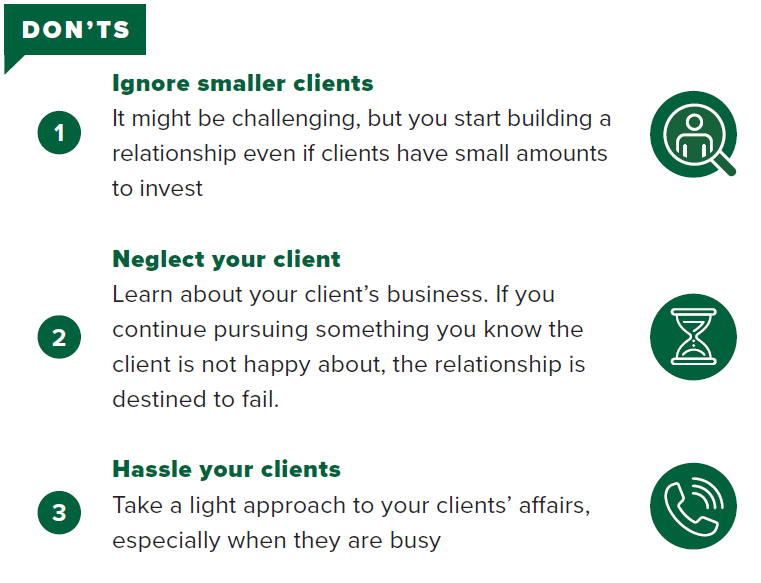Communicating during a crisis is a skill on its own. Feelings get mixed, messages can fluctuate and get misunderstood, and panic can overtake reason. Keeping a consistent conversation with clients about financial advice is already challenging in calm waters, let alone during a pandemic.
‘Stick with the plan. Nothing’s changed, just carry on,’ is a new version of the classic ‘keep calm and carry on’ slogan, according to Matthew Pescott Frost, head of Matthew Douglas. Speaking at the South East virtual roundtable organised by Pimco and Citywire, Pescott Frost said that during the height of the crisis his firm engaged clients with newsletters and blogs to keep them informed, while keeping their focus on the long term.
Despite the risk of information overload, which is likely today, his colleague Richard Skerritt of Skerritts approached his clients daily and received ‘a massive list of positive comments’.
He says: ‘We just give an update on what’s happening, what’s in the news, what’s happening from an investment point of view but also what’s happening with the pandemic, and we had fantastic feedback from that.
‘Building the trust we have with clients and trust is always the key to any long-term relationship, whether you are a financial adviser or a plumber.’
But sometimes no one solution fits all the problems. At Pimco, clients still wanted to receive market information, even if the provider couldn’t offer them a suitable product, for example. Odumade Odutola, vice president at Pimco, said that during the pandemic, investment managers gave ‘digestible’ clarifications on fixed income markets, which opened the door to more business for them. He says: ‘We have been able to introduce ourselves to more people.’
‘Building longstanding relationships is a friendship. You spend so much time talking to each other. You have to look at it on that personal level. You can’t just keep it about business.’
But how can you keep that dialogue consistent, pandemic or not? ‘Being constantly on their minds’ is Skerritt’s key for making sure clients remember you and refer their friends to you. But making that journey easy and educating them about advice ‘is the hardest thing in our industry’, he says.
“Having enough income is not their problem. Their problem is inheritance tax”
Financial education overlay
Education is a common theme in financial advice. Financial literacy, which is notoriously scarce in the UK, plays a big role in helping people recognise the value of financial advice. For example, the rise of robo-advice has encouraged many people to DIY, which has not always resulted in the best savings and investing decisions.
Nathan Harris, chartered financial planner at Lothbury Pendil, wants the government to ‘do more’ to bring financial education into schools alongside maths and business studies. This also includes having skilled teachers who can talk confidently about personal finance.
‘The Chartered Insurance Institute have the Discover Fortunes programme, which gets into schools and gets people interested. It’s about getting them young and getting them interested. There are some really good, young writers at the moment that are engaging with millennials and trying to get them to upskill,’ Harris says.
At the same time, with education, Harris warns of the ‘aggressive’ focus some financial commentators put on passive investing as opposed to active, which could mislead the less experienced.
‘There are some commentators out there saying that anybody who buys an active fund’s a fraud and that passive is obviously the only way to go for everything. Therefore, if you advise anything apart from what they say, they must be a fraud too. Sometimes the passive wagon is too aggressive. Accept that there’s different ways of giving advice.’
Education around advice also means explaining what an adviser is not. This includes being transparent to clients, especially for those that have had bad experiences. Harris does that by showing that advice is a two-part process. The first commits clients to a financial plan, and the second showcases his value as an adviser, once they are onboard.
The emergency of wealth transfer
With trillions expected to pass down to the younger generation, planning for wealth transfer is at the forefront for many financial professionals today. For Odutola, something that often gets overlooked is how financial needs have changed compared to the experience of baby boomers. This includes the use of robo-advice platforms and how they have changed the way financial advice is perceived.
‘House prices are no longer £100,000. They are multiples of hundreds of thousands now. To what degree and what stage would [young people] want to start engaging with advice, and to what degree are they going to want to use an automated system?
‘We’ve all talked about robo-advice for many years. Not much money has gone through that, but how can we combine advice and robo-advice to make an end-solution that is cost-effective or work better for clients? Do we need to adapt that deal with this transfer of wealth?’
Harris adds that with the ‘forced’ used of Zoom calls in the pandemic, he has managed to have many constructive conversations on inheritance with his clients.
‘You can get everybody together. You might say they’ll only join for 20 minutes at this point. Suddenly, the idea of using technology and people being forced into it [has helped]. If I’d asked people in their 80s to get on Zoom a year ago, some would have been fine and some would have said, ‘I’m just not doing that.’ They’ve all said: ‘Yes. I’ve done that because I wanted to speak to my grandchildren, so they’re less upset about it now’. It is helpful to have these conversations. That’s ultimately the big thing, and it is becoming a larger and larger part of our business.’
Inheritance tax is a big issue to tackle, also according to Frost. Many of his clients think the main problem about intergenerational planning is having enough income, only to then realise that it is all about working out inheritance tax instead.
He says: ‘Having enough income is not their problem. Their problem is inheritance tax. When you have that conversation, the next stage is to bring in the next generation and ask, “What is your plan?” Invariably, the answer is they don’t have a plan, and they haven’t really thought about it deeply enough.’
For Harris, it’s important to be forward looking. As for Frost, one way to treat intergenerational planning is to put children and parents in the same financial plan and aggregate costs.
‘In 2006, when children were able to have stakeholders putting £240, £300 a month in, we did those [plans] as a way of getting children saving. It’s the fact that they get to 18 and, unlike children’s trust funds, they wouldn’t be able to blow them.
‘Now we have clients whose children are turning 18 or are in their early 20s. They might have £40,000 or £50,000 in a personal pension at this point. Then we engage with them, because that is the threshold where we might be able to start looking after them. We can then transfer those decisions to the children and get them to take it over. I have done that with quite a few clients we had previously set up pensions for.’
“If we don’t give clients that level of access to their accounts and the ability, they will go elsewhere”
Technology boost
Robo-advice, a term that is both hated and loved in the industry, is naturally linked to the way advisers engage with younger clients, but it is also a more streamlined way to do business, in general.
Skerritt is working at a hybrid solution that will combine the work of an individual and an algorithm to help younger clients with their investments.
‘As long as they can see it on an app, they’re happy with that. They don’t need much more than that and the fact that you’re looking after that. Hopefully, the parents will see the funds keep growing. ‘The younger clients themselves will see these funds build up. That’s a good start to building that relationship.
‘We haven’t had time to spend a lot of our adviser time dealing with those [apps]. Having that automated approach is the only way that is ever going to work,’ Skerritt says.
But having an app to check your finances can be a double-hedged sword, advisers argue. It can become addictive and lead users to act too instinctively or treat the app as a social media platform. Still, not offering such a service could mean losing clients in the long run.
Skerritt says: ‘It’s a long-term investment. They shouldn’t look [at the app] every day, but we’re empowering them to do that. It does bring its own challenges. If we don’t give clients that level of access to their accounts and the ability, they will go elsewhere. Who knows whether Google, Amazon or Facebook are going to launch a rival service. That’s a real threat.’
Other advisers agree that investment apps bring their own set of challenges, especially when markets are not favourable.
Harris cites the example of apps that round up money from a purchase and put the difference in an investment fund. This method is a useful one in the long term, he says, but in the short term it could lead to big losses and make users rethink their allocation.
He says: ‘If you don’t have somebody sitting on their shoulder to explain that it’s a long-term thing, that you’re buying cheaper units, they could disengage and just sell out at a massive loss. That’s one of the major advantages of having an adviser.
‘The other thing is that often, if you’re buying an app, you might buy an app for its user friendliness or the way it looks. That means that you might be investing in something with substandard investments, or it could be very expensive.’
Despite all the benefits of technology, the pandemic has also highlighted how face-to-face communication still has a big role to play.
Odutola says: ‘You can have a Zoom for two of your catch-ups during the year and maybe the other two or three you can have in person.
‘[Technology] is progressive. It changes the way we behave, and one thing I’ve noticed through this period is that, with the use of technology, people are a lot more relaxed. When people are at home, they’ll have a conversation with you. When they’re in the office, they’ll worry about what the person next to them is thinking about and what they’re talking about. Technology has helped us get to know our clients better over this period.’



